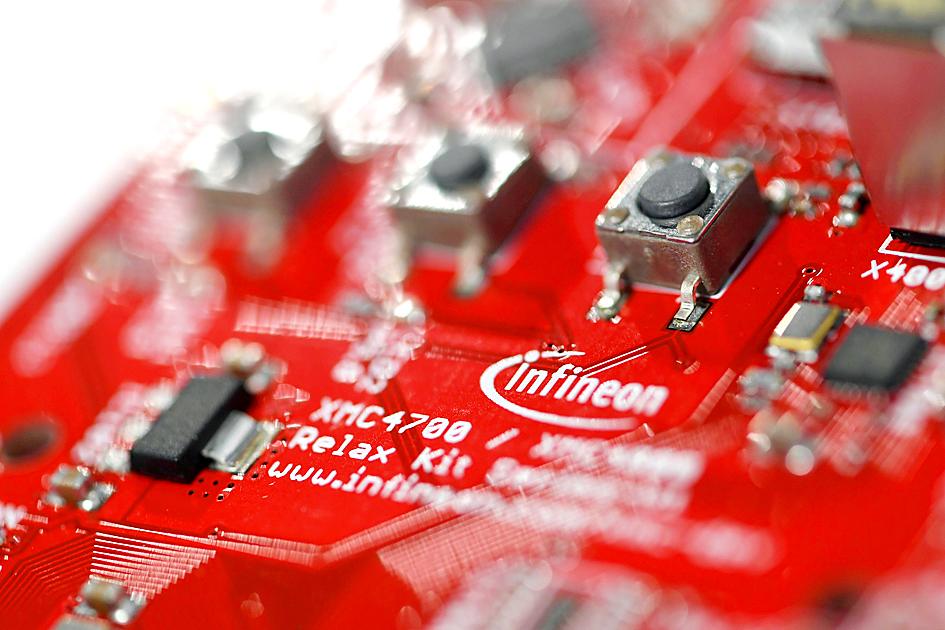German semiconductor producer Infineon Technologies AG on Tuesday said that microchip supply bottlenecks could continue into next year, in a blow to the auto industry.
“We predict that the imbalance between supply and demand will continue for a few quarters yet, with the risk that it lasts into 2022,” Infineon chief executive Reinhard Ploss said in a virtual news conference.
He added that the “bottlenecks” are a particular problem for the Munich-based company in areas where they do not produce the chips themselves, but buy them from subcontractors to equip microcontrollers for vehicles or smart appliances.

Photo: Reuters
The auto industry remains plagued by “severe delivery problems,” amid a rise in demand driven by a boom in electric vehicles, Ploss said.
Infineon, which plans to finish construction on a new chip production site in Austria later this year, has profited early this year from a booming semiconductor market.
“Electronics that help accelerate the energy transition and make work and home life easier remain in high demand,” Ploss said. “The push for digitalization continues unabated.”
While the surge in demand for electronic devices during the COVID-19 pandemic has helped chipmakers, it has also led to a semiconductor supply crunch in the auto industry, where chips are a key element in modern vehicles.
The shortage of chips has pushed many automakers to idle production lines for brief periods when they temporarily run out of supplies.
Infineon marketing director Helmut Gassel said that the shortage affected the production of about 2.5 million cars in the first quarter of this year.
The company reported sales of 2.7 billion euros (US$3.24 billion) in the first quarter, compared with analysts’ average estimate of 2.69 billion euros.
Infineon previously guided for second-quarter revenue of 2.5 billion euros to 2.8 billion euros, and third-quarter revenue of 2.6 billion euros and 2.9 billion euros.
The company predicted full-year revenue guidance of about 11 billion euros.
Infineon said its second-quarter revenues were particularly strong in its automotive segment.

RECYCLE: Taiwan would aid manufacturers in refining rare earths from discarded appliances, which would fit the nation’s circular economy goals, minister Kung said Taiwan would work with the US and Japan on a proposed cooperation initiative in response to Beijing’s newly announced rare earth export curbs, Minister of Economic Affairs Kung Ming-hsin (龔明鑫) said yesterday. China last week announced new restrictions requiring companies to obtain export licenses if their products contain more than 0.1 percent of Chinese-origin rare earths by value. US Secretary of the Treasury Scott Bessent on Wednesday responded by saying that Beijing was “unreliable” in its rare earths exports, adding that the US would “neither be commanded, nor controlled” by China, several media outlets reported. Japanese Minister of Finance Katsunobu Kato yesterday also

Jensen Huang (黃仁勳), founder and CEO of US-based artificial intelligence chip designer Nvidia Corp and Taiwan Semiconductor Manufacturing Co (TSMC, 台積電) on Friday celebrated the first Nvidia Blackwell wafer produced on US soil. Huang visited TSMC’s advanced wafer fab in the US state of Arizona and joined the Taiwanese chipmaker’s executives to witness the efforts to “build the infrastructure that powers the world’s AI factories, right here in America,” Nvidia said in a statement. At the event, Huang joined Y.L. Wang (王英郎), vice president of operations at TSMC, in signing their names on the Blackwell wafer to

‘DRAMATIC AND POSITIVE’: AI growth would be better than it previously forecast and would stay robust even if the Chinese market became inaccessible for customers, it said Taiwan Semiconductor Manufacturing Co (TSMC, 台積電) yesterday raised its full-year revenue growth outlook after posting record profit for last quarter, despite growing market concern about an artificial intelligence (AI) bubble. The company said it expects revenue to expand about 35 percent year-on-year, driven mainly by faster-than-expected demand for leading-edge chips for AI applications. The world’s biggest contract chipmaker in July projected that revenue this year would expand about 30 percent in US dollar terms. The company also slightly hiked its capital expenditure for this year to US$40 billion to US$42 billion, compared with US$38 billion to US$42 billion it set previously. “AI demand actually

RARE EARTHS: The call between the US Treasury Secretary and his Chinese counterpart came as Washington sought to rally G7 partners in response to China’s export controls China and the US on Saturday agreed to conduct another round of trade negotiations in the coming week, as the world’s two biggest economies seek to avoid another damaging tit-for-tat tariff battle. Beijing last week announced sweeping controls on the critical rare earths industry, prompting US President Donald Trump to threaten 100 percent tariffs on imports from China in retaliation. Trump had also threatened to cancel his expected meeting with Chinese President Xi Jinping (習近平) in South Korea later this month on the sidelines of the APEC summit. In the latest indication of efforts to resolve their dispute, Chinese state media reported that